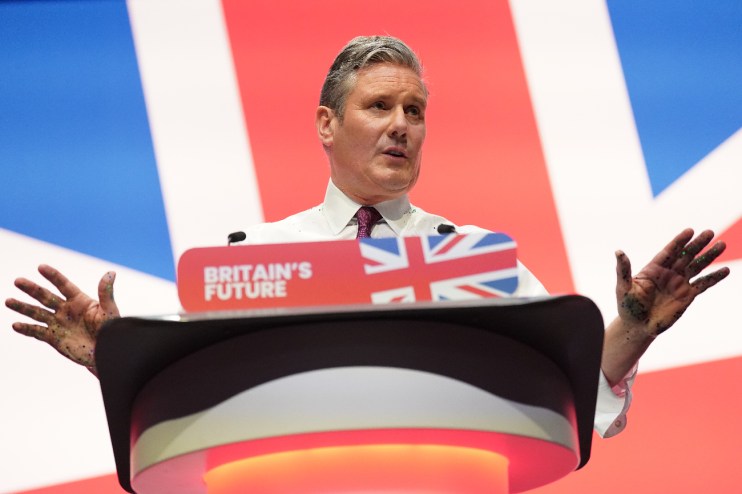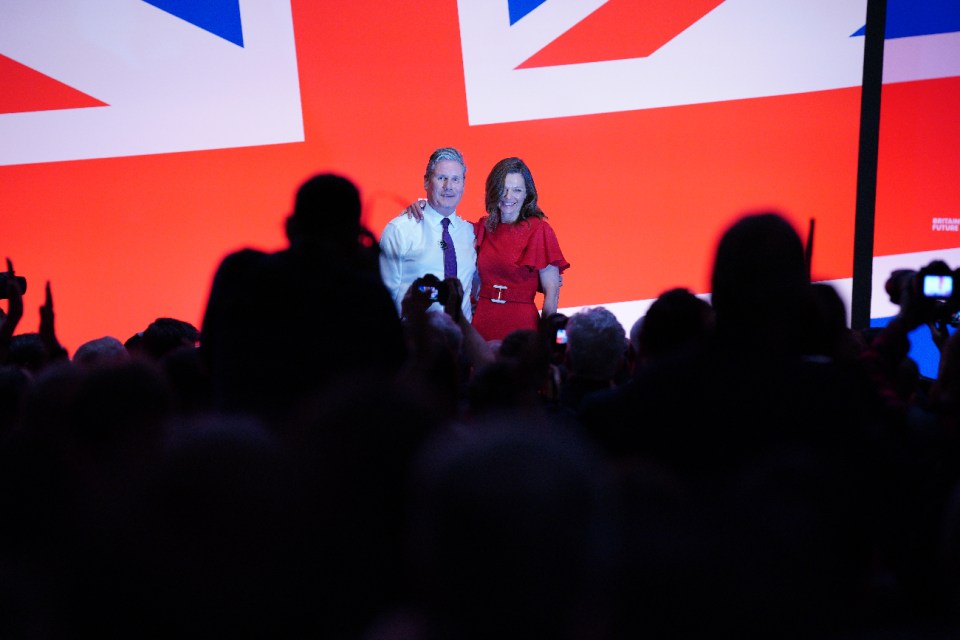Starmer vows Labour will ‘fight election on economic growth’ in glitter-hit speech

Labour will take the fight to the country on “economic growth,” Labour leader Sir Keir Starmer has pledged, as he launched his bid to enter No10 as Britain’s next Prime Minister.
Speaking from the main stage in Liverpool’s convention centre, in front of a huge Union Jack screen, Starmer vowed his renewed party would “hold out the hand of partnership to business” as he said the “fire of change” still burned in Britain.
It came after his shadow Chancellor Rachel Reeves was endorsed as the UK’s first female Chancellor by former Bank of England governor Mark Carney after her speech announcing plans for a new “fiscal lock” on budget changes and a “Covid corruption” taskforce.
Starmer said Labour would “champion the need for a competitive tax regime” and the party recognises that “private enterprise is the only way this country pays its way in the world”.
He told delegates, following a private sector focused conference which saw shadow business secretary Jonathan Reynolds address FTSE100 CEOs and SME entrepreneurs at packed breakfast forums, that: “Business is ready to join us in this endeavour.
“I can’t tell you how many conversations I’ve had with leading CEOs who tell me it’s the chopping and changing. The sticking plaster politics. The chaos. That is holding back investment in our country.”

Labour, he said, would launch a National Wealth Fund to “get on” and deliver investment and “work hand in glove with the private sector to rebuild this country” in a nod to Blair’s private finance initiatives (PFI) of the 1990s which saw New Labour construct schools and hospitals.
A public and private partnership, he said, would “build a bridge from the jobs we must protect today to the opportunities we have to win tomorrow”.
Starmer pledged that while in 1997, Labour rebuilt the public realm; in 1964, it modernised the economy; and in 1945, it built a new country “out of the trauma of collective sacrifice”, in 2024 “it will have to be all three”.
The Labour leader announced he would use money from closing the non-dom tax loophole to boost NHS capacity and get “clearing the backlog seven days a week”.
“..we will build a bridge from the jobs we must protect today to the opportunities we have to win tomorrow”.
Sir Keir Starmer
He vowed “we must bulldoze through” the “restrictive” planning system and launched his party’s plan to “get Britain building again” – constructing 1.5m new homes across the UK alongside a “new effort to rewire Britain” with the National Grid “moving a lot faster”.
Starmer said his party would “build the next generation of Labour new towns” and protect the green belt, while building on what he called “grey belt” areas such as “disused car parks”.
And he told delegates Labour’s Great British Energy company was a direct rejection of Prime Minister Rishi Sunak’s “row back on our climate mission”, following confirmation Labour would restore the 2030 ban on petrol and diesel cars, adding: “I say speed ahead.”
The party leader, who has embarked on a years-long mission to transform Labour after Jeremy Corbyn’s leadership and the anti-Semitism crisis, told viewers his answer to “Why Labour” was his plan for a “Britain built to last.”
He said: “It will require an entirely new approach – mission government. New priorities.
“Totally focused on the interests of working people… A changed Labour Party – no longer in thrall to gesture politics. No longer a party of protest. A party of service.”
Labour’s five missions – on clean energy, safer streets, growth for higher living standards, an NHS fit for the future and breaking barriers to opportunity – hung on huge banners in the hall.
A protester was removed from the stage before Starmer began his speech after appearing to smear the Labour leader with glitter.
It follows the Conservative Party conference in Manchester last week which saw Sunak announce he was scrapping the northern leg of the multi-billion pound HS2 rail project, in what he branded: “Long term decisions for a brighter future.”
The Prime Minister must call a general election by January 2025 at the very latest, with expectations that it will either fall in May or October 2024.
